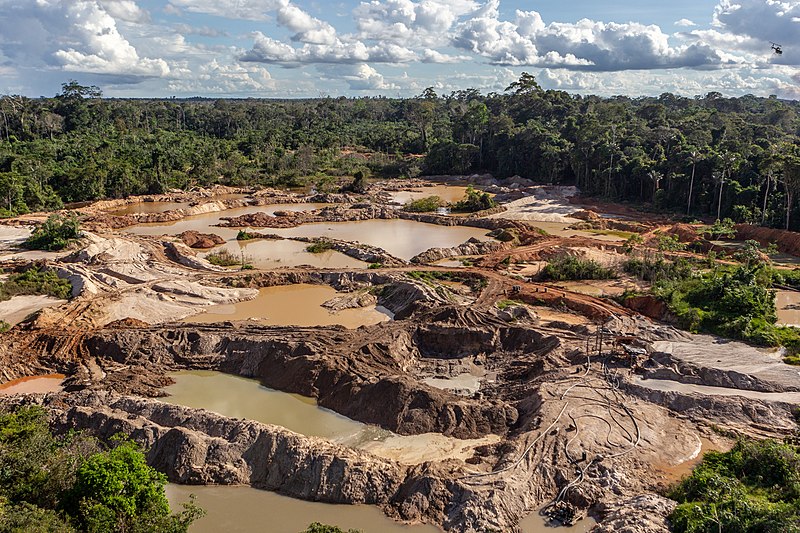As criminal organizations expand their operations to boost their revenues, they must also find new ways to launder these criminal proceeds to disguise their illegal origin. Through various techniques, criminals use honest business to forge earnings that are usually hard to be scrutinized by the state due to the nature of their operations, for example casinos or … mining. Then, the money obtained with criminal activities is attributed to this fake revenue; the money is then considered “clean”.
AMAZON’S COCAINE LAUNDRY AND DISTRIBUTION
In November 2021, a Federal Police operation called Narcos Gold targeted one of these schemes in the city of Itaituba, in the state of Pará, known for being a gold mining spot. The investigation pointed out the involvement of almost 19 allegedly artisanal mines, under the command of two fugitives, who are linked to drug trafficking groups from the Brazilian Southeast. Apart from money laundering, they are also trafficking drugs and invading indigenous lands to create and exploit mines. As usual, other crimes, such as robberies and murders, are also associated with the activities. This new scheme started to be called “Narcogarimpo”.
THE FACE BEHIND THE SCHEME
Operation Narcos Gold’s main target, the criminal Heverton Soares, known as Compadre Grota or Garimpeiro, was appointed as the head of a narcogarimpo scheme linked to Primeiro Comando da Capital (PCC), the largest criminal organization in the country, born in São Paulo.Soares is facing lawsuits for drug trafficking, criminal organization, money laundering, and murder in Maranhão, Rondônia, and São Paulo states. Soares has already been arrested in 2017 for commanding a group of more than ten military police officers that robbed financial institutions and acted as hitmen in Maranhão, Tocantins and Pará. He was captured while leading a convoy of cars carrying 15 weapons, including assault rifles, machine guns, and pistols. In addition, a police commissioner from Pará also said that his group was responsible for more than 20 murders. Four months after being arrested, Soares received a habeas corpus from the state court, which according to some delegates and journalists, has vestiges of corruption.
The investigations of Narcos Gold started in 2020, after the Brazilian Air Force approached a suspected plane which had taken-off from a mine. The pilot made a forced landing, set the aircraft on fire and then fled. Despite the attempt, he was unable to eliminate all traces of cocaine hydrochloride. Both the plane and the mine belonged to Soares.
The Federal Police also disclosed a connection that Soares has with the criminal Silvio Berri, linked to Comando Vermelho (CV) criminal group, from Rio de Janeiro. In the 2000s, Silvio Berri worked directly under the drug trafficker Fernandinho Beira-Mar, who is arrested in a maximum-security prison and used to be CV’s leader.
While Berri has 1 artisanal mining permit (PLG) near Itaituba, covering 48 hectares, Heverton Soares has 18, accumulating 762 hectares. The PLGs were created to regulate artisanal mines in areas under 50 hectares and do not require environmental impact studies. However, Soares is far from being an artisanal miner. According to the Federal Police, besides his mines, he has farms, stud farms, airstrips, and companies producing mining machines and car parts. His structure was also used to allocate more than R$ 30 million obtained with drug trafficking.
SINERGY AND EXPANSION
Besides using the mines to capitalize and launder money, the group leaded by Soares is also connected to PCC in drug trafficking. He used the mines in western Pará as a landing and takeoff airstrip to redistribute drugs to other states.
The presence of criminals linked to drug trafficking in the Southeast is not limited to the activities mentioned above. Roraima’s prison system has listed ten fugitives linked to the PCC who have taken refuge in mines in the Amazon rainforest. Armed with pistols, shotguns, and rifles, they started to act in the region as private security guards for miners against attacks of indigenous people and other criminals, until they decided to take control of the production and aimed their expansion at indigenous reserves.
A THOUGH CHALLENGE
All the problems caused by narcogarimpos in the North: drug trafficking, money laundering, destruction of the environment, invasion of indigenous lands, murders, and threats, are even worse when it is considered the great challenge of surveillance and control of an area of millions of square kilometers, remote, inaccessible, and poorly monitored.



